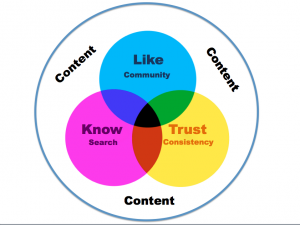If they don’t care, are you even there?
June 18, 2015
Your creative needs to be creative. No doubt about that. But sadly, many people think that’s enough.
I received an email from a college student, asking if he could interview me. Two of his questions in particular caught my attention because they put the spotlight on a dangerous mistake that many seasoned marketers make.
It all revolves around the idea that marketing needs to be wacky or groundbreaking with the end goal being that it’s memorable. I can think of a lot of crazy, funny and touching marketing tactics that I’ve remembered for years that never prompted me to buy the product.
Should your creative be fresh, interesting and different from what everyone else in your category is doing? Sure.
But you can’t stop there. And you can’t start there.
You start with understanding your own product or service as objectively as you can (how does it rock, where is it weak, etc.) and who the ideal consumer for that product or service happens to be.
And you end by telling those ideal customers enough about your product or service that they understand why it’s the perfect fit for them.
You have to match your sweet spot customer with the benefits that make them the right buyer for what you sell.
I thought at it might be useful to you to see what he asked and my replies.
Q: When developing a concept do you try to go with something new and groundbreaking or do you have a more straightforward, proven approach to getting the message out to the target audience.
The truth is – what sells is the truth. We begin by understanding our audience and what they care about. We learn as much about them as possible. Every product/service has a “perfect fit” customer. It’s our job to figure out who that is and then craft our message to appeal to that person.
What is new today will be old hat tomorrow. So gimmicks and shock value and crazy aren’t good marketing strategies. Look at the Kmart “Ship My Pants” ads. Are they funny? Are they memorable? The answer to both those questions is yes.
But will it sell more stuff? I don’t think so. And THAT is our job. We help clients sell stuff. If we don’t do that – no matter how funny or memorable our work is – we got it wrong.
So the creative approach depends on the audience and what will connect with them and help them see why what we sell is what they need or want most.
Q: I believe that promoting brand recall is the most important objective in a message strategy. What is your favorite way to do this?
First – I respectfully disagree. I believe the most important objective in a message strategy is to help the audience understand how this product or service is uniquely positioned to benefit THEM. The most important objective is brand relevance. Again, it doesn’t matter if you are memorable if you aren’t relevant.
The best way to develop brand relevance is to understand your sweet spot customer and why they would care and then figure out how to deliver value towards that for them. A brand’s job is to be important to the consumer. Harley does this brilliantly. For Harley riders and prospects – no other bike will do. Anything else is a poor substitute. Harley is about living the dream of a biker – freedom, independence, camaraderie etc. No brand captures and sells that like Harley. Harley could run a bunch of ads that promote the name so we’d never forget it. But instead they promote the dream/fantasy of owning a motorcycle and tie their name to delivering on that dream.
I’d much rather have 100 sweet spot customers reach for their wallet than 10,000 people remember the ad. Remember that and you’ll enjoy a long career in this crazy business that I love. Good luck!
More


